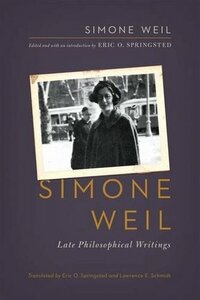Take a photo of a barcode or cover
I dont fully understand the point of the final essay. It felt like a summary of the history of classical physics with some criticisms about the fact that approximations always commit some infinitesimal error.
This, by itself, felt like an unnecessary critique of physics.
This, by itself, felt like an unnecessary critique of physics.
partly read. the last essay, "at the price of an infinite error", i decided to to not touch yet, i'm not well-versed to the movement of scientific developments early 20th century and i was lost in the first few paragraphs of it, but i will get to it some point in the future, if i have to envoke weil's reflection on her contemporary science development and how she attunes it to greek traditions.
overall, i'm a little enamored with weil—maybe less of her ideas but more of her as a person. the way she views mundane gesture in the way she does, the way we read or value cosmopolitan literature like magazines (this one, i'm a little reserved with how she writes them in the ninth essay), reminds me of the way sontag writes. things we assume rudimentary until she knocks it back on the back of our head, realigning, again, why words work they way they do, and instances when they do not.
god in plato is my favorite one; i fished a few lines that could help my academic writing path. her essay on literatures and morals keeps eluding me. i'm not a devout catholic, nor do i think i associate moral relativism in my principles, especially that built on catholicism, so i'm not very quick to agree on her discourses (literatures being inherently good or evil made me scratch my head, underline the sentences with my pencil, and doggy-ear the page). i'm still eager to read the rest of her works and see why carson, camus, and my other favorite writers can't seem to stop invoking her. i can feel the provocativeness in her ideas, but i'm not quite there.
overall, i'm a little enamored with weil—maybe less of her ideas but more of her as a person. the way she views mundane gesture in the way she does, the way we read or value cosmopolitan literature like magazines (this one, i'm a little reserved with how she writes them in the ninth essay), reminds me of the way sontag writes. things we assume rudimentary until she knocks it back on the back of our head, realigning, again, why words work they way they do, and instances when they do not.
god in plato is my favorite one; i fished a few lines that could help my academic writing path. her essay on literatures and morals keeps eluding me. i'm not a devout catholic, nor do i think i associate moral relativism in my principles, especially that built on catholicism, so i'm not very quick to agree on her discourses (literatures being inherently good or evil made me scratch my head, underline the sentences with my pencil, and doggy-ear the page). i'm still eager to read the rest of her works and see why carson, camus, and my other favorite writers can't seem to stop invoking her. i can feel the provocativeness in her ideas, but i'm not quite there.
challenging
reflective
medium-paced
“Truth, beauty, justice, compassion are always good, everywhere.”
“We do not enter into the truth without having passed through our own nothingness; without having sojourned for a long time in a state of total and extreme humiliation.”
An eclectic, but not unconnected, selection of essays. Whatever her views, the frequent complexity of them, her writing is deeply affecting. Compelling. Challenging. Sometimes awe inspiring. Sometimes convoluted. Agreement with her is not necessary to respect her. Really, each essay deserves a full review, which I am not going to do here. But if you're looking for a good framework for Weil's thinking, her philosophy and theology, this book is great. This book includes her views on philosophy (what it is and isn't), literature, art, science, social justice, much more. God, of course, is throughout.
In brief: For Weil, real philosophy is a practice, not theory, a system or a building of a position. It is a way to wisdom, transcending knowledge. It requires detachment from personal ideas about value. Reflection. Not knowledge but transformation. A devoted Platonist for whom philosophy is turning towards truth (& salvation). Contradictions are at the center of philosophy & human life; exposing, not eliminating, these contradictions is progress. Philosophy is eternal, renewed. It doesn’t prescribe.
"All human knowledge is hypothetical.”
“Philosophy does not consist in accumulating knowledge, as science does, but in changing the whole soul.”
The essay "What Is Sacred In Every Human Being" is really extraordinary and if you focus on one essay here, this should probably be it. Some ideas from it: What is sacred is impersonal, anonymous, like Truth & Beauty. It requires attention, solitude, silence, humility. It is not “I,” the cult of self, of personality, nor is it “us,” drowning in a collectivity. Intelligence is related to opinion & language, which only allows us to move in a closed space. You have to admit this captivity, metaphorically bang your head against a wall repeatedly until you can grasp inexpressible thoughts & go beyond the limits of intelligence to wisdom.
“Extremely brilliant people of intelligence can be born, live, and die in falsity and error.”
"An intelligent man who is proud of his intelligence is like a prisoner who is proud of having a big cell.”
This is a book that requires focus and time (and likely lots of notes). To try to rush through this looking for key arguments is pointless. But it is a very rewarding read, a book you can return to to either study Weil specifically or to deepen your thinking on certain topics, or in general.
“We do not enter into the truth without having passed through our own nothingness; without having sojourned for a long time in a state of total and extreme humiliation.”
An eclectic, but not unconnected, selection of essays. Whatever her views, the frequent complexity of them, her writing is deeply affecting. Compelling. Challenging. Sometimes awe inspiring. Sometimes convoluted. Agreement with her is not necessary to respect her. Really, each essay deserves a full review, which I am not going to do here. But if you're looking for a good framework for Weil's thinking, her philosophy and theology, this book is great. This book includes her views on philosophy (what it is and isn't), literature, art, science, social justice, much more. God, of course, is throughout.
In brief: For Weil, real philosophy is a practice, not theory, a system or a building of a position. It is a way to wisdom, transcending knowledge. It requires detachment from personal ideas about value. Reflection. Not knowledge but transformation. A devoted Platonist for whom philosophy is turning towards truth (& salvation). Contradictions are at the center of philosophy & human life; exposing, not eliminating, these contradictions is progress. Philosophy is eternal, renewed. It doesn’t prescribe.
"All human knowledge is hypothetical.”
“Philosophy does not consist in accumulating knowledge, as science does, but in changing the whole soul.”
The essay "What Is Sacred In Every Human Being" is really extraordinary and if you focus on one essay here, this should probably be it. Some ideas from it: What is sacred is impersonal, anonymous, like Truth & Beauty. It requires attention, solitude, silence, humility. It is not “I,” the cult of self, of personality, nor is it “us,” drowning in a collectivity. Intelligence is related to opinion & language, which only allows us to move in a closed space. You have to admit this captivity, metaphorically bang your head against a wall repeatedly until you can grasp inexpressible thoughts & go beyond the limits of intelligence to wisdom.
“Extremely brilliant people of intelligence can be born, live, and die in falsity and error.”
"An intelligent man who is proud of his intelligence is like a prisoner who is proud of having a big cell.”
This is a book that requires focus and time (and likely lots of notes). To try to rush through this looking for key arguments is pointless. But it is a very rewarding read, a book you can return to to either study Weil specifically or to deepen your thinking on certain topics, or in general.


